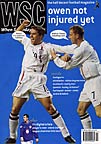 Howard Pattison warns Exeter supporters against being fooled by Uri Geller's illusionary exploits
Howard Pattison warns Exeter supporters against being fooled by Uri Geller's illusionary exploits
The media coverage was inescapable. Even Radio 5 Live was running a competition to see who could suggest the most likely – or unlikely – headline in the next day’s newspapers. You wouldn’t think that Uri Geller, newly appointed to the unusual position of co-chairman at Exeter City, could still attract that kind of publicity. And maybe he can’t, for no amount of spoon bending is going to obscure the fact that something far more peculiar is going on at St James’ Park.
The immediate responses from the fans were diverse, ranging from “Isn’t he a Reading fan?” to “Great! He must have loads of money”. Uri Geller certainly does have money, but he’s not putting it into Exeter City – he’s been quite clear about that. And although his son has been a committed fan since 1996, Geller is no supporter. So what exactly is he doing there? Surely it can’t be to practise his extraordinary gifts? No, not that either, for here is Uri proclaiming: “At no point whatsoever will I use any paranormal powers to influence performances and results on the pitch.” Well, thank goodness. The last time he tried that in Exeter they lost 5-1. Furthermore, he goes on to say that his role will be as “an inspirational, motivational figure, perhaps popping down to the dressing-room just to give the team a boost – but certainly nothing more than that.”
The official explanation from Geller’s new partners, Mike Lewis and John Russell, is that he will be a figurehead, a celebrity of international renown who can attract investment into the club. As Woodward and Bernstein are told in All the President’s Men: “Follow the money.” Well, we would, but it’s hard finding any to follow. The only transaction believed to have taken place – and some doubt this – is that Lewis and Russell have bought former chairman Ivor Doble’s majority shareholding for an undisclosed sum. Everything else is murky.
A spokesman from a rival consortium, headed by Joe Gadston and Steve Perryman, said that the key difference between the two groups was the willingness of Lewis and Russell to pay off much of the club’s £1.6 million debts. This is refuted in just about everything subsequently said by Lewis and Russell, who instead favour talking up the need for new investment and reassuring fans that money will be found on an “as required basis”. As Lewis has expressed his disgust that “another group” were given details of their offer, he has inadvertently lent credence to their rivals’ claim.
This is not an auspicious start to a new era. Neither Lewis nor Russell comes to Exeter with glowing references. The Exeter fans seemed slow to pick up on this, the early reaction generally being one of cautious optimism. Within a few days, however, warning signals were being flashed from Swansea (where Lewis’s three-month tenure might be described as a farce heralding a tragedy), and heartfelt messages of sympathy were coming from Scarborough (where Russell presided over their relegation from the League, although, bless him, he prefers to lay the blame squarely at the feet of the Carlisle United goalkeeper, Jimmy Glass).
Now the mood seems to be changing. Some Exeter fans are starting to panic at rumours put about by the scaremongers. Much of this speculation will prove unfounded, but it does not make for a stable relationship between the board and the fans. The situation could easily be tempered by the new occupants being more forthcoming with details of the takeover. Instead they hide behind a “confidentiality agreement” and leave the fans to imagine the worst: if they are lucky, they’ve been taken over by a couple of incompetents; if not, they’ve been had by a pair of devious opportunists.
And all the while Uri Geller poses for the photographers, drawing attention from the real issues. A supposed master of illusion and sleight of hand, Geller himself has now become a distraction technique.
From WSC 185 July 2002. What was happening this month